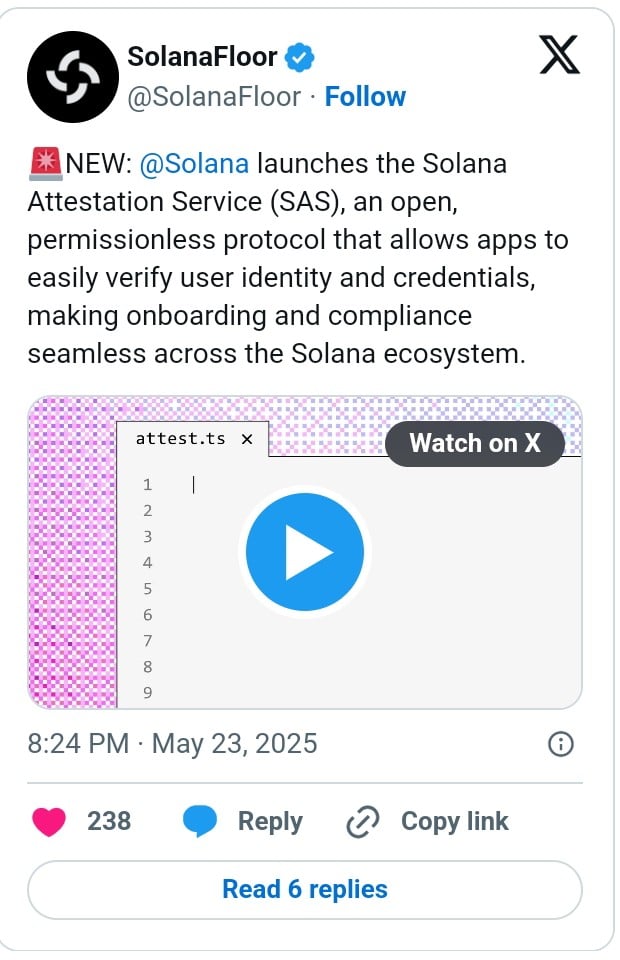ARTICLE AD BOX

- The Solana Attestation Service (SAS) has officially gone live on the mainnet to enable compliance, access control, and reputation systems across the ecosystem.
- This is reported to be the first project of the Solana Identity Group; intriguingly, several projects have started building with it.
Solana Identity Group and the Solana Foundation have announced the launch of Solana Attestation Service (SAS) on the Solana mainnet. According to the official blog post detailing this development, the integration would ensure that off-chain information, including geographic eligibility, KYC checks, accreditation status, etc, are associated with users’ wallets.

Interestingly, this development happened soon after Solana Mobile announced that the global shipping of its Web3 phone, Seeker, would commence in August 2025, as detailed in our recent discussion.
The Details of the Solana Attestation Service Launch
Reviewing this report, we found that this attestation is quite distinct from the others as they could be signed, verified, and reused across on-chain without risking sensitive data.
By providing a neutral and permissionless attestation layer, SAS enables compliance, access control, reputation systems, and programmable identity across the Solana ecosystem. It’s a better, easier experience for both end users and builders.
According to experts, the deployment of the SAS has become necessary as the capital market on Solana grows. As highlighted in our previous coverage, its market capitalization, for instance, has been estimated to reach $250 billion by the end of the year. Regardless of its enormous growth, each application is said to build its own verification flows, while managing sensitive data. Expectedly, this has created user friction, operational overhead and regulatory risk.
Designed to be secure, composable, and private for different blockchain use cases, SAS is reported to change the dynamic by providing three main features.
The first is a neutral and open infrastructure that ensures that developers, issuers, and users can effectively operate without much reliance on “centralized gatekeepers”. Additionally, SAS provides portable credentials that can be held by users in their wallets. Finally, it offers programmable Trust for applications to access with one SDK call. This implies that there will be no need to manage backends or even identity databases.
With its use case cutting across different backgrounds including Gaming, DeFi, DePIN, and Financial Services, SAS enables KYC passports, Sybil Resistance, Region-based access control, DAO Reputation systems, Accreditation verification, and Device or location attestations.
Our research shows that this is the first project of the Solana Identity Group which was formed by the collection of teams across the Solana ecosystem. Meanwhile, its success has attracted the interest of several projects, including Solid, Solana ID, Trusta Labs, Civic, Wecan, etc, which are already building with it.
The official launch of SAS also follows the decision of Solana to redefine the ecosystem by addressing severe minting bugs, which was highlighted in our recent blog post. Apart from this, Solana’s mainnet recently hosted Chainlink’s Cross-Chain Interoperability Protocol (CCIP) to unlock new opportunities, as also indicated in our recent news brief.
Amidst the backdrop of this, the price of SOL is struggling to break out of a key resistance range, as it has hovered between $170 and $187 for several days now. However, analysts believe that the asset could break out in the near term to hit $212, as noted in our earlier discussion.
.png)
 4 hours ago
7
4 hours ago
7








 English (US)
English (US)